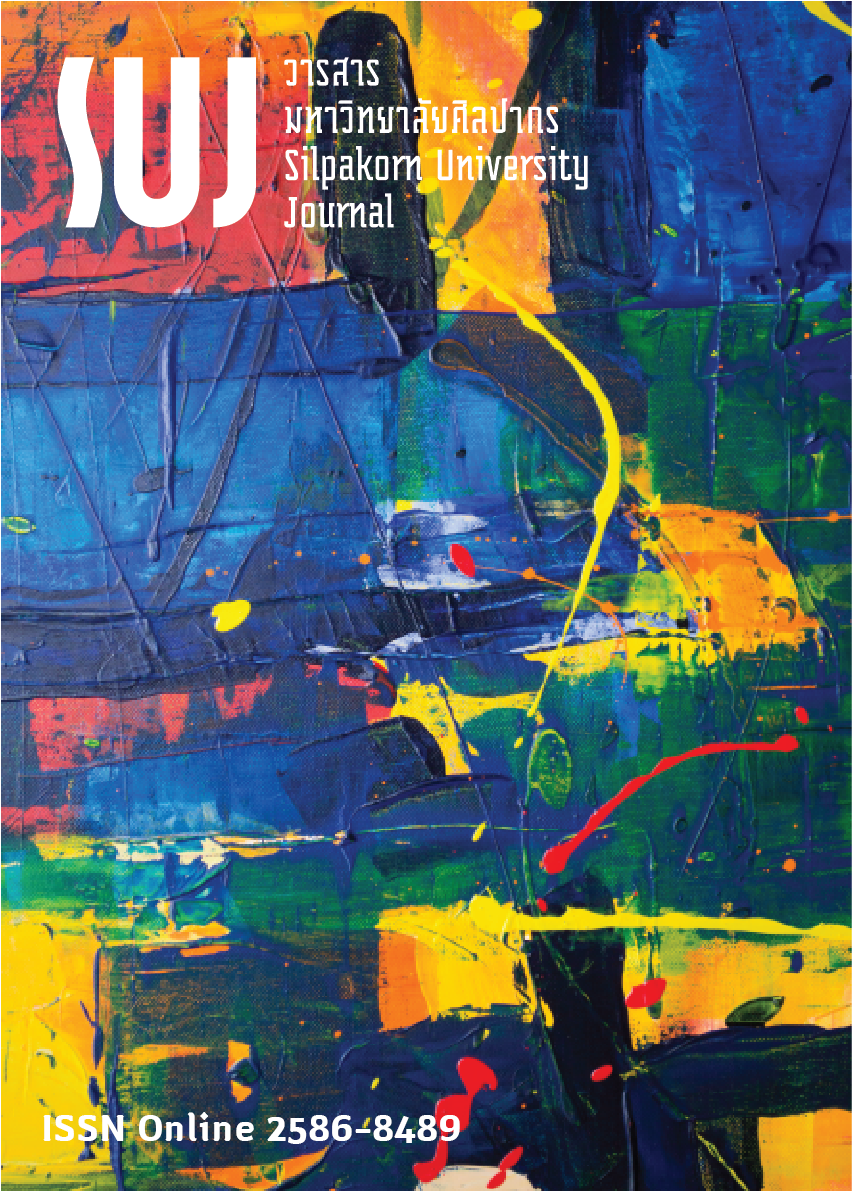แปลตัวเปลี่ยนตน : ข้อพิจารณาเรื่องการแปลในปรัชญาของปอล ริเกอร์ (Translation as transformation of self: reflections on Paul Ricoeur’s philosophy of translation)
Main Article Content
บทคัดย่อ
บทความวิจัยนี้มุ่งศึกษาวิเคราะห์ว่าการแปลมีผลต่อการเปลี่ยนแปลงความเข้าใจตัวตนของเราอย่างไรในปรัชญาของ ปอล ริเกอร์ โดยเริ่มต้นจากปัญหาเรื่องความตึงแย้งระหว่างตัวตนของเราอันเป็นสิ่งที่เรารู้ได้เพียงคนเดียวและตัวตนของคนอื่น ซึ่งทั้งสองไม่สามารถสื่อสารทำความเข้าใจกันได้ ริเกอร์จึงเสนอกระบวนทัศน์ของการแปลในฐานะกุญแจที่ไขไปสู่คำตอบของปัญหานี้ สำหรับริเกอร์การแปลมิใช่เพียงการถ่ายทอดความจากภาษาหนึ่งไปสู่อีกภาษาหนึ่งเท่านั้น แต่เป็นความพยายามในการเข้าใจและค้นพบตัวตนใหม่ของมนุษย์ ซึ่งรวบรวมประสบการณ์ของคนอื่นให้เป็นของเราด้วย สำหรับริเกอร์การแปลทำหน้าที่หลักเป็นกระบวนทัศน์สามแบบ คือ แบบภาษา แบบมนุษย์ และแบบตีความตัวบทและเรื่องเล่า กระบวนทัศน์ทั้งสามทำหน้าที่หลักในการบอกว่าเราเองเป็นส่วนผสมของคนอื่น วัฒนธรรมอื่น และภาษาอื่นผ่านการแปล
This research article aims to analyze Paul Ricoeur’s philosophy of translation which carries a complex understanding of the self. Starting from the tension between the knowledge of one’s solipsistic “self” and the unknowable “other” or radical “alter ego” which implies their mutual incommunicability, Ricoeur proposes the paradigm of translation as a key response to this problem. For him, translation is not only an activity of transferring messages from one language to another but also an attempt to understand and discover one’s new self which includes and appropriates the experience of the other. Through his dialectical method, Ricoeur proposes a conception of translation which articulates 3 paradigms: a linguistic paradigm, an anthropological paradigm, and a hermeneutical paradigm. These three paradigms confirm that the human self is to be understood as a fusion of oneself and others, of oneself and other cultures and of oneself through translation of other languages.
Downloads
Article Details

อนุญาตภายใต้เงื่อนไข Creative Commons Attribution-NonCommercial-NoDerivatives 4.0 International License.
เอกสารอ้างอิง
Audard, C. (2004). Care. In Barbara Cassin (Ed.), Vocabulaire Européen des philosophes, (pp. 211-212). Paris: Seuil.
Deweer, D. (2015). Communication, Translation and the Global Community of Persons. Ricoeur Studies, 1: 46-56.
Hénaff, M. (2006). La Condition Brisée des Langues : Diversité Humaine, Altérité et Traduction. L’es-prit, 5(3): 65-80.
Jervolino, D. (2006). Pour une Philosophie de la Traduction, à l’école de Ricœur. Revue de Métaphsique et de Morale, 2(4): 229-238.
Kearney, R. (2010). Le Paradigme de la Traduction. In Jérôme Porée, & Gilbert Vincent (Eds.), Paul Ricoeur: la Penséeen Dialogue, (pp.169-177). Rennes: PU Rennes.
Kharmandar, M. (2015). Ricoeur’s Extended Hermeneutic Translation. Theory: Metaphysics, Narrative, Ethics, Politics. Ricoeur Studies, 6(1): 73-93.
Kemp, P. (2010). Ricoeur, entre Heidegger et Levinas: l’Affirmation Originale entre l’Attestation Ontologique et l’Injonction Ethique. In Peter Kemp (Ed.), Sagesse Pratique de Paul Ricoeur : Huit Etudes, (pp. 61-84). Paris: Edition du Sandre.
Marinescu, P. (2015). Traduire le Passé : Enjeux et Défi d’une Opération Historiographique. Etudes Ricoeurennes, 6(1): 57-72.
Ricoeur, P. (1986). Du texte à l’action. Paris: Seuil.
Ricoeur, P. (2004). Sur la traduction. Paris: Bayard.
Saito, N. (2009). Beyond Monolingualism : Philosophy as Translation and the Understanding of Other Cultures. Ethics and Education, 4(2): 131-139.
Yaprang, Muhammadilyas. (2018). Islam and Democracy: Introductory Reflections (อิสลามกับประชาธิปไตย: บทสะท้อนเบื้องต้น). In Eakarin Tuansiri, & Anwar Koma (Eds.), Democracy and Islam: Introductory Observation (ประชาธิปไตยกับอิสลาม: ข้อสังเกตเบื้องต้น), (pp. 23-32). Pattani: Pattani Forum.


